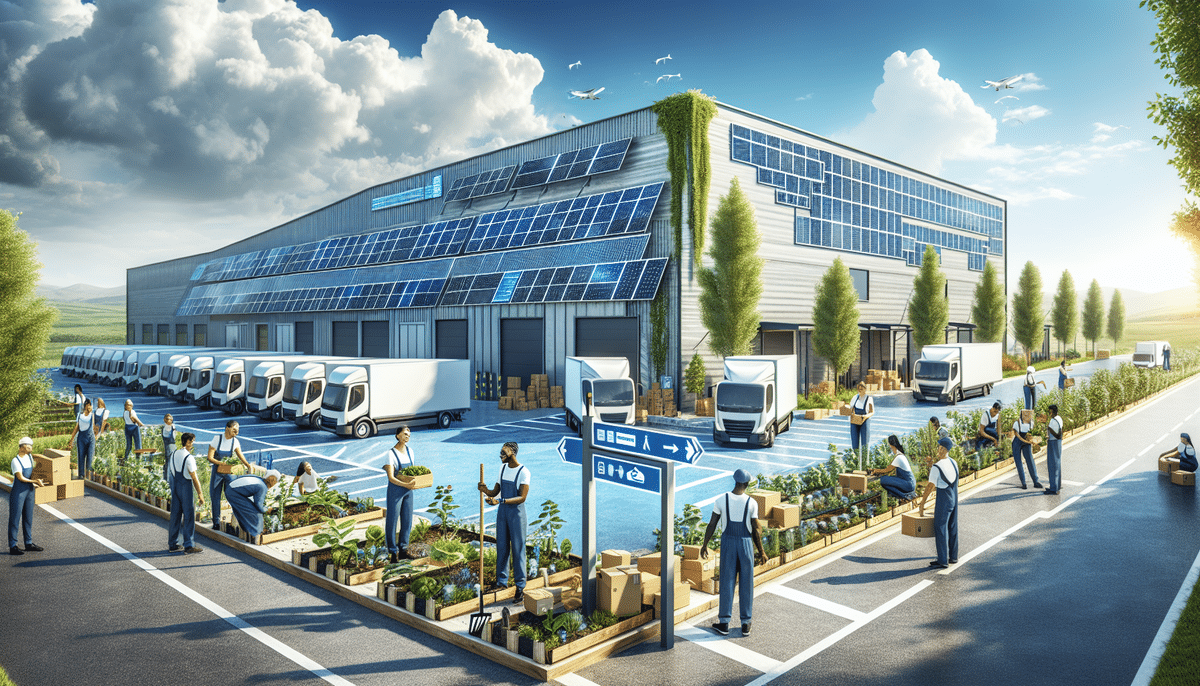Importance of Sustainability in Third-Party Logistics
As global sustainability concerns escalate, businesses across all sectors are increasingly pressured to adopt eco-friendly practices. Third-Party Logistics (3PL) providers play a crucial role in supply chain management, placing them in a unique position to drive sustainability initiatives. By integrating sustainable practices, 3PL companies can not only reduce their environmental footprint but also enhance operational efficiency and gain a competitive edge in the market.
Defining Sustainable Third-Party Logistics (3PL)
Sustainable 3PL involves the adoption of environmentally responsible practices within the third-party logistics industry. This encompasses strategies aimed at reducing the environmental impact of logistics operations and supply chains, such as minimizing carbon emissions, optimizing resource usage, and enhancing social responsibility. The growing emphasis on sustainability is driven by increasing concerns over climate change, resource depletion, and the demand from customers and stakeholders for responsible business practices.
Key benefits of sustainable 3PL practices include:
- Carbon Footprint Reduction: Implementing renewable energy sources, optimizing transportation routes, and reducing waste can significantly lower greenhouse gas emissions.
- Cost Savings: Sustainable practices often lead to operational efficiencies that translate into reduced costs over time.
- Social Responsibility: Ensuring fair labor practices, supporting community initiatives, and promoting employee development enhances the company's social impact.
For example, according to the McKinsey & Company 2023 Supply Chain Report, companies that invest in sustainable logistics have seen an average of 10% reduction in operational costs within three years.
Top Sustainable Practices in Third-Party Logistics
Fuel-Efficient Transportation
Utilizing fuel-efficient vehicles and alternative transportation modes, such as electric or hybrid trucks, reduces fuel consumption and greenhouse gas emissions.
Resource Optimization
Minimizing the use of paper and other resources through digitalization and efficient resource management helps in reducing waste and operational costs.
Renewable Energy Investments
Investing in renewable energy sources to power logistics operations, such as solar panels for warehouses, can significantly lower carbon emissions.
Sustainable Packaging Solutions
Implementing eco-friendly packaging options reduces waste and promotes sustainability throughout the supply chain.
Waste Reduction and Recycling
Adopting recycling programs and repurposing waste materials contribute to a circular economy and minimize environmental impact.
Transportation Route Optimization
Using advanced routing software and data analytics to determine the most efficient delivery routes reduces fuel consumption and emissions.
Collaborative Logistics
Sharing transportation resources with other businesses decreases the number of empty trucks on the road, lowering the overall carbon footprint.
Benefits of Adopting Sustainable Methods in Third-Party Logistics
Adopting sustainable practices in third-party logistics offers a multitude of benefits:
- Environmental Impact Reduction: Decreases the carbon footprint and resource consumption associated with logistics operations.
- Operational Efficiency: Streamlining processes reduces waste and increases overall operational efficiency.
- Cost Savings: Efficient resource utilization leads to significant cost reductions in the long term.
- Customer Attraction and Retention: Attracts environmentally conscious customers and enhances customer loyalty.
- Enhanced Brand Reputation: Builds a positive brand image by demonstrating a commitment to responsible business practices.
- Compliance and Risk Management: Ensures adherence to evolving environmental regulations, reducing the risk of penalties.
- Innovation and New Opportunities: Drives innovation and opens up new business opportunities within the industry.
Sustainable practices also facilitate compliance with regulatory changes and meet stakeholder expectations, fostering strong relationships with suppliers and partners who share similar sustainability values.
Challenges in Implementing Sustainability in Third-Party Logistics
Despite the clear benefits, 3PL companies often face several challenges when adopting sustainable practices:
- Lack of Standardization and Regulation: Inconsistent standards and regulations can impede the implementation of uniform sustainability practices across the industry.
- Upfront Investment Costs: Significant initial investments required for sustainable technologies and practices can be a barrier, especially for smaller companies.
- Internal Resistance: Resistance from employees or stakeholders who may not be fully committed to sustainability initiatives can hinder progress.
- Customer Awareness and Priority: Low prioritization of sustainability by customers can make it difficult for 3PL companies to justify the investment in sustainable practices.
- Global Operations Complexity: Diverse regulations and standards across different countries complicate consistent sustainability implementation.
- Supply Chain Complexity: Tracking and measuring the environmental impact across complex supply chains can be challenging.
Addressing these challenges requires strategic planning, stakeholder engagement, and often, a phased approach to implementing sustainability initiatives to build commitment and demonstrate value over time.
Case Studies: Successful Implementation of Sustainable Practices in Third-Party Logistics
Several 3PL companies have successfully implemented sustainable practices, setting benchmarks for the industry:
- Emission Reduction: A leading 3PL company integrated a fleet management system that optimized vehicle routing and decreased fuel consumption by 20%, resulting in significant emission reductions.
- Waste Reduction: Another company developed a reverse logistics program that minimized waste by enhancing material reuse and recycling, leading to a 30% reduction in overall waste.
- Comprehensive Sustainability Strategy: A third company implemented a holistic sustainability strategy that included employee engagement, stakeholder outreach, and measurable sustainability goals, resulting in improved environmental performance and increased client satisfaction.
Future Trends in Sustainable Third-Party Logistics
Looking ahead, several emerging trends are shaping the future of sustainability in third-party logistics:
- Integration of Sustainability into Core Operations: Sustainability will become a fundamental aspect of business operations, with companies that fail to adopt sustainable practices potentially facing competitive disadvantages.
- Circular Supply Chains: There is a growing trend towards circular supply chains aimed at minimizing waste and maximizing material reuse.
- Social and Ethical Focus: Increased emphasis on the social and ethical dimensions of sustainability will require companies to align practices with broader societal values.
- Technological Innovation: Advances in technology, such as AI-driven route optimization and the adoption of renewable energy solutions, will continue to drive sustainability improvements.
- Regulatory Developments: Stricter environmental regulations will push 3PL companies to innovate and adopt sustainable practices more rapidly.
In conclusion, sustainability is not just an ethical imperative but a strategic necessity for third-party logistics companies. By embracing sustainable practices, 3PL providers can reduce their environmental impact, achieve operational efficiencies, enhance their brand reputation, and ensure long-term business resilience in an increasingly eco-conscious market.




















